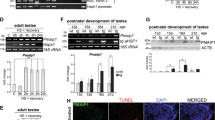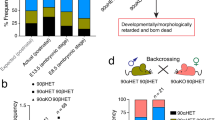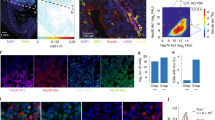Abstract
In many species, the early post-fertilization development of the egg appears to occur mainly under maternal control and does not require transcription of the embryonic genome1. In the mouse this situation is restricted to the one-cell stage; activation of the embryonic genome occurs at the late two-cell stage2–4 and results in a drastic change in the spectrum of proteins synthesized. This activation is preceded by a decrease in the overall synthesis of proteins at the end of the one-cell stage5–7 and the appearance, at the early two-cell stage, of a set of new polypeptides of molecular weight ∼70,000 (70K) (refs 2, 8, 9). This can be compared with the series of events that occur after hyperthermia in differentiated cells10–13. Heat shock results in an arrest of most transcription and translation; subsequently, expression of a limited set of genes, the heat shock genes, precedes the overall reactivation of cellular genome. Here we show that the 70K early two-cell-specific proteins are identical to two of the mouse heat shock proteins, HSP 68 and HSP 70.
This is a preview of subscription content, access via your institution
Access options
Subscribe to this journal
Receive 51 print issues and online access
$199.00 per year
only $3.90 per issue
Buy this article
- Purchase on Springer Link
- Instant access to full article PDF
Prices may be subject to local taxes which are calculated during checkout
Similar content being viewed by others
References
Davidson, E. H. Gene Activity in Early Development (Academic, New York, 1976).
Flach, G., Johnson, M. H., Braude, P. R., Taylor, R. A. S. & Bolton, V. N. EMBO J. 1, 681–686 (1982).
Magnuson, T. & Epstein, C. J. Biol. Rev. 56, 369–408 (1981).
Johnson, M. H. Biol. Rev. 56, 463–498 (1981).
Biggers, J. D. J. Reprod. Fert. Suppl. 14, 41–54 (1971).
Petzoldt, U., Hoppe, P. C. & Illmensee, K. Wilhem Roux Arch. dev. Biol. 189, 215–219 (1980).
Goddard, M. J. & Pratt, H. P. J. Embryol. exp. Morph. 73, 111–123 (1983).
Van Blerkom, J. & Brockway, G. O. Devl. Biol. 44, 148–157 (1975).
Howe, C. C. & Solter, D. J. Embryol. exp. Morph. 52, 209–225 (1979).
Ashburner, M. & Bonner, J. J. Cell 17, 241–254 (1979).
Schlesinger, M. J., Aliperti, G. & Kelley, P. M. Trends biochem. Sci. 7, 222–225 (1982).
Arrigo, A. P. Molec. gen. Genet. 178, 517–524 (1980).
Schlesinger, M. J., Ashburner, M. & Tissières, A. (eds) Cold Spring Harbor Symp. Heat-Shock from Bacteria to Man (Cold Spring Harbor Laboratory, New York, 1982).
Bensaude, O. & Morange, M. EMBO J. 2, 173–177 (1983).
Cleveland, D. W., Fischer, S. G., Kirschner, M. W. & Laemmli, U. K. J. biol. Chem. 252, 1102–1106 (1977).
Levey, I. L., Troike, D. E. & Brinster, R. L. J. Reprod. Fert. 50, 147–150 (1977).
Levey, I. L. & Brinster, R. L. J. exp. Zool. 203, 351–360 (1978).
Graziosi, G., Micali, F., Marzari, R., De Cristini, F. & Savoini, A. J. exp. Zool. 214, 141–145 (1980).
Savoini, A., Micali, F., De Cristini, F. & Graziosi, G. Wilhem Roux Arch. dev. Biol. 190, 161–167 (1981).
Schultz, G. A. & Tucker, E. B. in Development in Mammals Vol. 1 (ed. Johnson, M. H.) 69–97 (North-Holland, Amsterdam, 1977).
Bravo, R. & Knowland, J. Differentiation 13, 101–108 (1979).
Bienz, M. & Gurdon, J. B. Cell 29, 811–819 (1982).
Kelley, P. M. & Schlesinger, M. J. Molec. cell. Biol. 2, 267–274 (1982).
Morimoto, R. & Fodor, E. J. cell. Biochem. Suppl. 7 A, 128 (1983).
Komar, A. J. Reprod. Fert. 35, 433–443 (1973).
Dyban, A. P. & Khozhai, L. I. Bull. exp. Biol. Med. 89, 528–530 (1980).
Kaufman, M. H. Nature 302, 258–260 (1983).
Whittingham, D. G. J. Reprod. Fert. Suppl. 14, 7–22 (1971).
Whitten, W. K. in Advances in the Biosciences Vol. 6, (ed. Raspe, G.) 129–139 (Pergamon, Oxford, 1971).
O';Farrell, P. H. J. biol. Chem. 250, 4007–4021 (1975).
Ansorge, W. Analyt. Biochem. (in the press).
Author information
Authors and Affiliations
Rights and permissions
About this article
Cite this article
Bensaude, O., Babinet, C., Morange, M. et al. Heat shock proteins, first major products of zygotic gene activity in mouse embryo. Nature 305, 331–333 (1983). https://doi.org/10.1038/305331a0
Received:
Accepted:
Issue Date:
DOI: https://doi.org/10.1038/305331a0
This article is cited by
-
The BCL-2 pathway preserves mammalian genome integrity by eliminating recombination-defective oocytes
Nature Communications (2020)
-
Modulation of heat shock proteins during macrophage differentiation
Inflammation Research (2012)
-
HSFs and regulation of Hsp70.1 (Hspa1b) in oocytes and preimplantation embryos: new insights brought by transgenic and knockout mouse models
Cell Stress and Chaperones (2011)
-
Heat Shock Protein 32 in Human Peripheral Blood Mononuclear Cells: Effect of Aging and Inflammation
Journal of Clinical Immunology (2005)
-
Delayed activation of the paternal genome during seed development
Nature (2000)
Comments
By submitting a comment you agree to abide by our Terms and Community Guidelines. If you find something abusive or that does not comply with our terms or guidelines please flag it as inappropriate.



